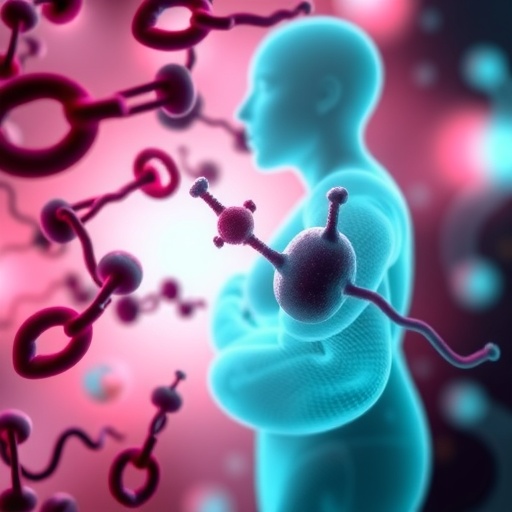Recent research has elucidated the intricate relationship between host stress proteins and their influence on gut microbiota, particularly in the context of hemorrhagic shock. This groundbreaking study led by Deng, Wu, and Xiong, highlights the foundational role of these proteins in shaping the body’s response to significant blood loss. Through a combination of Mendelian randomization and comprehensive animal models, the researchers have unveiled a nexus that suggests a profound interplay between the immune system, gut microbiota, and the physiological responses to stress.
Hemorrhagic shock, which occurs due to severe blood loss, triggering a cascade of inflammatory responses, poses significant challenges to patient care. Understanding the biological underpinnings of this condition is critical for developing effective therapeutic strategies. The research not only delves into the mechanisms by which hemorrhagic shock disrupts cellular functions but also sheds light on how host stress proteins modulate these processes through gut microbiota.
Host stress proteins, often termed “heat shock proteins,” are in charge of maintaining protein homeostasis and assisting in the proper folding of proteins, especially during cellular stress conditions. These proteins are crucial during episodes of hemorrhagic shock, as they aid in restoring cellular functions and mitigating damage following tissue ischemia. The researchers utilized Mendelian randomization to establish a genetic basis for the role of these proteins, further cementing their importance in the stress response.
The role of gut microbiota as a modulator of immune responses cannot be understated. As the study indicates, the composition and function of gut microbiota can significantly influence systemic inflammation and overall health outcomes in patients experiencing hemorrhagic shock. The research reveals that disruption in the gut microbiome could exacerbate the effects of hemorrhagic shock, leading to worse clinical outcomes, thereby emphasizing the need for a holistic approach to treatment.
By employing animal models, the team was able to simulate the effects of hemorrhagic shock and observe the subsequent changes in both stress protein expression and gut microbiota composition. Their findings showed that certain stress protein levels correlate with shifts in gut microbial populations. This suggests that elevating certain host stress proteins may be a potential therapeutic target to improve recovery trajectories following hemorrhagic incidents.
Moreover, the insights gained from this research open avenues for exploring probiotic therapies that could potentially stabilize or enhance gut microbiota composition in the wake of hemorrhagic shock. This approach could serve as a supplementary treatment strategy alongside traditional medical interventions. The restoration of a healthy gut microbiome may, therefore, provide both a barrier against systemic inflammation and a way to promote recovery.
The implications of the findings extend far beyond the confines of hemorrhagic shock. The relationship between stress proteins and gut microbiota plays a broader role in understanding various inflammatory diseases, suggesting that manipulation of these pathways could lead to novel treatments. The study sets a precedent for future research aimed at unraveling the connections between host mechanisms and gut health, paving the way for targeted therapies based on individual genetic and microbiotic profiles.
The research team asserts that targeted interventions that focus on enhancing host stress protein activity or modifying gut microbiota could significantly influence patient outcomes. This could not only improve recovery rates but also mitigate long-term complications that arise from severe hemorrhagic events. The results urge clinicians to consider a multifaceted approach that encompasses both genetic predisposition and microbiomic factors in managing patients at risk for hemorrhagic shock.
In summary, the study by Deng and colleagues represents a significant leap forward in our understanding of hemorrhagic shock and its connection to gut microbiota through host stress proteins. It underscores the necessity for a thorough investigation into the biological framework that dictates responses to significant physiological stressors. The findings advocate for more integrated research that bridges genomics, microbiology, and clinical practice, ultimately aiming to improve patient care and treatment outcomes.
This research not only emphasizes the complexity of the human body’s response to stress but also the potential for innovative approaches in medicine. As our understanding deepens, it could lead to essential new guidelines for managing hemorrhagic shock and similar conditions, rooted in cutting-edge science and patient-centered care.
As the publication of their findings in the Journal of Translational Medicine sparks dialogue within the scientific community, the hope is that future research will further elucidate the mechanisms at play and validate the proposed therapeutic strategies. By continuing to explore the multifactorial interactions between host genetics, stress proteins, and gut microbiota, we can pave the way for revolutionary advancements in treating one of the most critical emergency medical conditions.
The collective goal of this groundbreaking study is to catalyze a shift in how we approach the treatment of hemorrhagic shock and related inflammatory conditions. With more research on the horizon, the potential to develop game-changing therapies that leverage our understanding of the gut-host axis appears promising.
As researchers further investigate the role of gut microbiota and stress proteins, the future of personalized medicine may begin to reflect these intricate interdependencies. In using robust methodologies, such as Mendelian randomization and innovative animal models, the science is set to not only inform clinical practices but inspire a new era of research focused on the gut microbiome as a critical player in health and disease.
Subject of Research: The impact of host stress proteins on hemorrhagic shock through gut microbiota.
Article Title: Host stress proteins shape hemorrhagic shock via gut microbiota: evidence from Mendelian randomization and animal models.
Article References:
Deng, G., Wu, L., Xiong, S. et al. Host stress proteins shape hemorrhagic shock via gut microbiota: evidence from Mendelian randomization and animal models.
J Transl Med 23, 1324 (2025). https://doi.org/10.1186/s12967-025-07364-8
Image Credits: AI Generated
DOI: https://doi.org/10.1186/s12967-025-07364-8
Keywords: Host stress proteins, hemorrhagic shock, gut microbiota, Mendelian randomization, inflammation, emergency medicine, personalized medicine, probiotic therapies, animal models, clinical outcomes.
Tags: animal models in biomedical researchcellular functions in hemorrhagic shockgut microbiota and hemorrhagic shockhost stress proteinsinflammatory responses to blood lossinfluence of microbiota on immune systemMendelian randomization in medical researchphysiological responses to stressprotein homeostasis during stressrole of heat shock proteinstherapeutic strategies for hemorrhagic shockunderstanding gut-immune interactions





